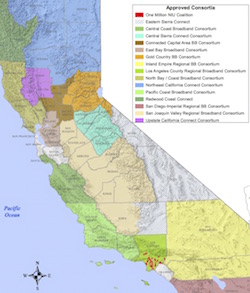California broadband consortia try for second round of grants

Click for the big picture.
Funding for the regional broadband consortia that the California Public Utilities Commission approved four years ago has either expired or soon will. For most, that’ll mean a gap in funding while proposals for new consortia grants are processed. A total of fifteen applications were filed by last month’s deadline.
The San Diego consortium did not reapply, but it’s been inactive for some time. The One Million New Internet Users consortium in Los Angeles County didn’t come back either, which is no surprise given the way it was ripped by a state audit.… More

![By Hyderabaduser [GFDL (https://www.gnu.org/copyleft/fdl.html) or CC BY-SA 3.0 (https://creativecommons.org/licenses/by-sa/3.0)], via Wikimedia Commons](https://www.tellusventure.com/images/2016/2/stb_update.jpg)
![By MPD01605 (talk · contribs) (Own work) [Public domain], via Wikimedia Commons](https://www.tellusventure.com/images/2016/2/highway_signs.jpg)
![By Billy Hathorn (Own work) [CC BY 3.0 (https://creativecommons.org/licenses/by/3.0)], via Wikimedia Commons](https://www.tellusventure.com/images/2016/2/fbi_building.jpg)
![By H. W. Houck [Public domain], via Wikimedia Commons](https://www.tellusventure.com/images/2016/2/armstrong_radio.jpg)
![By Ltljltlj [Public domain], via Wikimedia Commons](https://www.tellusventure.com/images/2016/2/san_benito_county_g1.jpg)


![By Katatonic (not a high-five) [CC BY 2.0 (https://creativecommons.org/licenses/by/2.0)], via Wikimedia Commons](https://www.tellusventure.com/images/2016/2/sockem.jpg)
